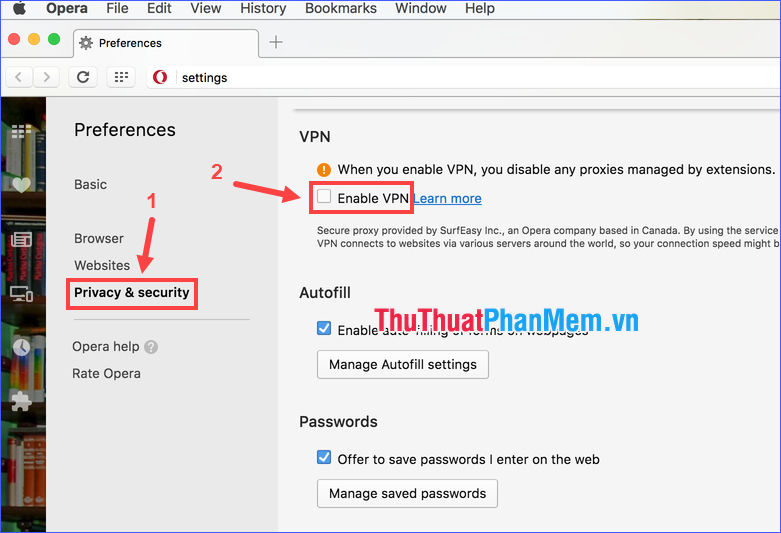Download Opera Mail - Opera Mail is a lightweight, customizable mail client. Reading, labeling, and filtering messages has never been so easy. Opera Software develops the Opera Web browser, a high-quality, multi-platform product for a wide range of platforms, operating systems and embedded Internet products. In addition to the web browser, the other main component in the Opera suite is the Opera Mail client, previously known as M2.
The Opera browser includes everything you need for private, safe, and efficient browsing, along with a variety of unique features to enhance your capabilities online. The Opera browser for Windows, Mac, and Linux computers maximizes your privacy, content enjoyment, and productivity. Download the old version of Opera for Mac. If you experience any compatibility issues with Opera for Mac, consider downloading one of the older versions of Opera.MacUpdate stores previous versions of Opera for you since v.
How to remove Opera from Mac computers
What is Opera?
Opera is a legitimate web browser, however, research shows that some affiliate marketers generate revenue by promoting it through fake Adobe Flash Player installers and other rogue download/installation set-ups - they use them to trick people into downloading and installing potentially unwanted applications (PUAs) such as browser hijackers and adware. In some cases, they use them to distribute malicious software including ransomware, Trojans, and other malware. Therefore, third party downloaders and installers should not be used to download or install any software.
Many deceptive websites attempt to trick visitors into believing that the installed version of Adobe Flash Player is out of date. They encourage people to use rogue downloaders/installers, which actually download and install unwanted, potentially malicious software. In this case, the downloaded fake Adobe Flash Player installer installed Opera. As mentioned, this is a legitimate web browser, however, if it was downloaded and installed unintentionally, it is likely to have been caused through a rogue download/installation setup promoted through a deceptive website. These websites and download/installation set-ups cannot be trusted, since they are often used to trick people into downloading and installing PUAs or even malicious software. They distribute PUAs such as adware and browser hijackers. Most adware-type apps display advertisements. When clicked, these open dubious websites or cause unwanted downloads and installations. PUAs can record browsing-related information including sensitive, personal details. Browser hijackers also track information. Additionally, they promote the addresses of fake search engines by changing browser settings. Trojans are malicious programs that often cause chain infections by downloading and installing other malware (e.g., ransomware). Ransomware encrypts data and, in most cases, victims cannot decrypt their files without specific tools held only by the cyber criminals who designed the ransomware program. In summary, fake Adobe Flash Player installers and other rogue download/installation set-ups can be the reason behind unintentional installations of legitimate software such as Opera, however, they can also cause infiltration of PUAs and malicious programs - these can cause problems such as identity theft, monetary, data loss, issues relating to browsing safety, privacy, and so on. Therefore, software and files should never be downloaded from unofficial, deceptive websites, or downloaded/installed through rogue set-ups.
| Name | Opera potentially unwanted application |
| Threat Type | PUP (potentially unwanted program), PUA (potentially unwanted application), Mac malware, Mac virus. |
| Symptoms | A program that you do not recall installing suddenly appeared on your computer. |
| Distribution Methods | Deceptive pop-up ads, free software installers (bundling), fake Flash Player installers. |
| Damage | Monetary loss (unnecessary purchase of fake software), unwanted warning pop-ups, slow computer performance. |
| Malware Removal (Mac) | To eliminate possible malware infections, scan your Mac with legitimate antivirus software. Our security researchers recommend using Combo Cleaner. |

Some examples of websites that are designed to promote fake Adobe Flash Player installers include bestevervideoplayernew[.]info, worldofcontenting[.]info and theultimatesafevideoplayers[.]info. Typically, these web pages claim that Adobe Flash Player is out of date and encourages people to install a new version through a rogue setup. If the Opera browser is installed on the operating system but was not downloaded or installed intentionally, a rogue setup is probably responsible. Note that the setup may also have been used to distribute PUAs.
How did potentially unwanted applications install on my computer?
In most cases people download and install potentially unwanted applications (and sometimes legitimate software such as Opera) inadvertently when they are included into the download/installation set-ups of other software. This distribution method is known as 'bundling'. Developers use this method to trick people into downloading and installing unwanted programs together with their required software. In most cases, information about additional downloads and installations can be found in settings such as 'Custom', 'Advanced', and 'Manual', however, many people download and install programs without checking and changing the settings, thereby allowing PUAs to infiltrate.

How to avoid installation of potentially unwanted applications
It is important to download software and files from official, trustworthy websites and via direct links. Peer-to-Peer networks (e.g., torrent clients, eMule), unofficial websites, third party downloaders, installers and other similar channels, sources should not be used to download/install software or files. Check 'Advanced', 'Custom' and other settings of the download and installation setup. Dismiss offers to download or install unwanted software before completing download/installation process. If clicked, intrusive ads that are displayed on dubious pages can open other, potentially malicious websites or cause download/installation of unwanted applications. Therefore, never click these ads. Note that they might also appear on legitimate web pages. Remove any unwanted apps (extensions, add-ons, plug-ins) installed on the browser immediately. Also remove software of this kind that is installed on the operating system. If your computer is already infected with PUAs, we recommend running a scan with Combo Cleaner Antivirus for macOS to automatically eliminate them.
Screenshot of a rogue installer downloaded from a deceptive website:
Screenshot of the 'Introduction' section of a fake Adobe Flash Player installer:
Screenshot of the 'Offers' section of a fake Adobe Flash Player installer:
Fake Photoshop CC cracking tool designed to promote the Opera browser:
Screenshots of another deceptive installer promoting Opera web browser:
Installer step 1:
Installer step 2:
Installer step 3:
Instant automatic Mac malware removal:Manual threat removal might be a lengthy and complicated process that requires advanced computer skills. Combo Cleaner is a professional automatic malware removal tool that is recommended to get rid of Mac malware. Download it by clicking the button below:
▼ DOWNLOAD Combo Cleaner for MacBy downloading any software listed on this website you agree to our Privacy Policy and Terms of Use. To use full-featured product, you have to purchase a license for Combo Cleaner. Limited three days free trial available.
Quick menu:
- STEP 1. Remove PUA related files and folders from OSX.
- STEP 2. Remove rogue extensions from Safari.
- STEP 3. Remove rogue add-ons from Google Chrome.
- STEP 4. Remove potentially unwanted plug-ins from Mozilla Firefox.
Video showing how to remove adware and browser hijackers from a Mac computer:
Potentially unwanted applications removal:
Remove potentially unwanted applications from your 'Applications' folder:
Click the Finder icon. In the Finder window, select 'Applications'. In the applications folder, look for 'MPlayerX', 'NicePlayer', or other suspicious applications and drag them to the Trash. After removing the potentially unwanted application(s) that cause online ads, scan your Mac for any remaining unwanted components.
Combo Cleaner checks if your computer is infected with malware. To use full-featured product, you have to purchase a license for Combo Cleaner. Limited three days free trial available.
Remove opera potentially unwanted application related files and folders:
Click the Finder icon, from the menu bar. Choose Go, and click Go to Folder...
Check for adware-generated files in the /Library/LaunchAgents folder:
In the Go to Folder... bar, type: /Library/LaunchAgents
In the “LaunchAgents” folder, look for any recently-added suspicious files and move them to the Trash. Examples of files generated by adware - “installmac.AppRemoval.plist”, “myppes.download.plist”, “mykotlerino.ltvbit.plist”, “kuklorest.update.plist”, etc. Adware commonly installs several files with the same string.
Check for adware generated files in the /Library/Application Support folder:
In the Go to Folder... bar, type: /Library/Application Support
In the “Application Support” folder, look for any recently-added suspicious folders. For example, “MplayerX” or “NicePlayer”, and move these folders to the Trash.
Check for adware-generated files in the ~/Library/LaunchAgents folder:
Opera Application Mac
In the Go to Folder bar, type: ~/Library/LaunchAgents
In the “LaunchAgents” folder, look for any recently-added suspicious files and move them to the Trash. Examples of files generated by adware - “installmac.AppRemoval.plist”, “myppes.download.plist”, “mykotlerino.ltvbit.plist”, “kuklorest.update.plist”, etc. Adware commonly installs several files with the same string.
Check for adware-generated files in the /Library/LaunchDaemons folder:
In the Go to Folder... bar, type: /Library/LaunchDaemons
In the “LaunchDaemons” folder, look for recently-added suspicious files. For example “com.aoudad.net-preferences.plist”, “com.myppes.net-preferences.plist”, 'com.kuklorest.net-preferences.plist”, “com.avickUpd.plist”, etc., and move them to the Trash.
Scan your Mac with Combo Cleaner:
If you have followed all the steps in the correct order you Mac should be clean of infections. To be sure your system is not infected run a scan with Combo Cleaner Antivirus. Download it HERE. After downloading the file double click combocleaner.dmg installer, in the opened window drag and drop Combo Cleaner icon on top of the Applications icon. Now open your launchpad and click on the Combo Cleaner icon. Wait until Combo Cleaner updates it's virus definition database and click 'Start Combo Scan' button.
Combo Cleaner will scan your Mac for malware infections. If the antivirus scan displays 'no threats found' - this means that you can continue with the removal guide, otherwise it's recommended to remove any found infections before continuing.
After removing files and folders generated by the adware, continue to remove rogue extensions from your Internet browsers.
Opera potentially unwanted application removal from Internet browsers:
Remove malicious extensions from Safari:
Remove opera potentially unwanted application related Safari extensions:
Open Safari browser, from the menu bar, select 'Safari' and click 'Preferences...'.
In the preferences window, select 'Extensions' and look for any recently-installed suspicious extensions. When located, click the 'Uninstall' button next to it/them. Note that you can safely uninstall all extensions from your Safari browser - none are crucial for normal browser operation.
- If you continue to have problems with browser redirects and unwanted advertisements - Reset Safari.
Opera For Mac 10.9.5
Remove malicious plug-ins from Mozilla Firefox:
Opera For Mac 10.7.5
Remove opera potentially unwanted application related Mozilla Firefox add-ons:
Opera Application Mac
Open your Mozilla Firefox browser. At the top right corner of the screen, click the 'Open Menu' (three horizontal lines) button. From the opened menu, choose 'Add-ons'.
Choose the 'Extensions' tab and look for any recently-installed suspicious add-ons. When located, click the 'Remove' button next to it/them. Note that you can safely uninstall all extensions from your Mozilla Firefox browser - none are crucial for normal browser operation.
- If you continue to have problems with browser redirects and unwanted advertisements - Reset Mozilla Firefox.
Remove malicious extensions from Google Chrome:
Remove opera potentially unwanted application related Google Chrome add-ons:
Open Google Chrome and click the 'Chrome menu' (three horizontal lines) button located in the top-right corner of the browser window. From the drop-down menu, choose 'More Tools' and select 'Extensions'.
In the 'Extensions' window, look for any recently-installed suspicious add-ons. When located, click the 'Trash' button next to it/them. Note that you can safely uninstall all extensions from your Google Chrome browser - none are crucial for normal browser operation.
- If you continue to have problems with browser redirects and unwanted advertisements - Reset Google Chrome.
